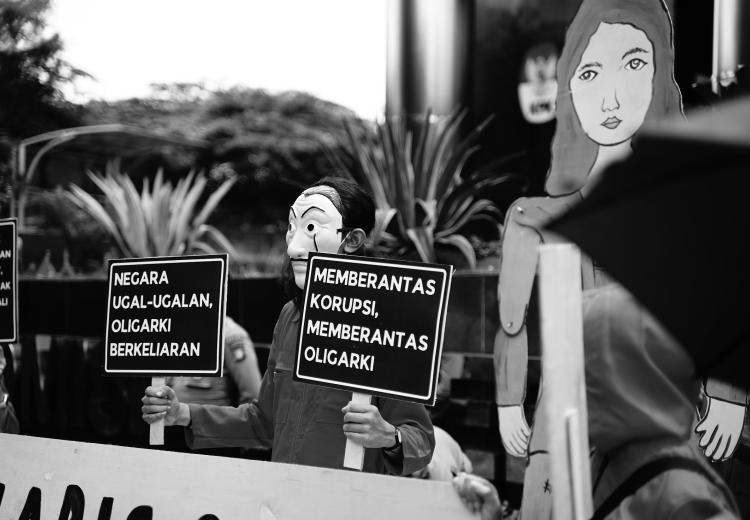Sentencing Trend Monitoring Report 2023

Indonesia’s efforts in combating corruption are weakening. According to data from Transparency International, Indonesia's score in the Corruption Perception Index (CPI) stagnated in 2023. Evidently, Indonesia’s CPI score reached only 34 and the country lost its position in the global ranking from 110th to115th. In fact, Indonesia has been maintaining a similar score in the past decade. Indonesia’s score in the Rule of Law Index, one of the determinants of CPI, also stagnated from 2022 to 2023. Indeed, the government’s agenda of eradicating corruption, and especially law enforcement against corruption, must be revamped.
The many other names of the crimes of corruption – such as extraordinary crime, a serious crime, and a white-collar crime – hints to their nefarious effects. Not only because corruption often involves public officials, but because the impacts of this crime on the victims (namely the people) directly affect all dimensions of life – the economy, social, and human rights. Therefore, Indonesia’s legal structure, its provisions, and legal culture must undertake a greater role to close the loopholes that have been giving way to the commission of this crime. This intention, however, is difficult to realize with feeble law enforcement, and one that is increasingly favoring criminals.
Stakeholders’ support and the synergy among law enforcement authorities in eradicating corruption have also deteriorated. For example, in the past decade, there has not been any substantial policy and legislative support from both the government and the Parliament. Instead of passing the Bill on Asset Confiscation, Bill on Cash Transaction Restriction, or amending the Law on the Eradication of the Crimes of Corruption, the legislature proceeded with amending the Law on the Corruption Eradication Commission and the Law on Corrections and passed the new Criminal Code. As the result, the ever-challenging pursuit of recovering considerable state losses due to corruption, continued prevalence of bribery, the weakening of the Corruption Eradication Commission (KPK), the continued facilitation of convicts in corruption crimes, and the light sentences imposed in corruption cases are only likely to increase in the future.
The legal politics setback is hand in hand with the leadership of former president Joko Widodo, even though the “Nawacita” (the political commitments made during the 2014 general election) expressly mentions that law enforcement efforts were going to be reinforced with the introduction of anti-corruption values. The pending bills, which should strengthen Indonesia’s corruption eradication, are also not new bills – they have been on the table for at least the past ten years. They are also demanded not only by the people, but also by law enforcement authorities, since the current laws are not potent enough in creating the desired deterrence.
There are similar challenges found at the end of the law enforcement process, namely the trying of defendants. Often, the sentences imposed by the panel of judges fail to give justice, especially to the aggrieved, whether it is the state or the community. For example, the principal punishments (pidana pokok) are egregiously light as reflected in the terms of imprisonment and amount of fines. Meanwhile, the supplemental punishments, such as compensation payable (uang pengganti) and deprivation of certain rights, are also not proportional to the significant harm caused by this crime. As a result, there is no cease in corrupt practices, whilst the state continues to suffer from financial damages and the hard work of law enforcement authorities (the police, the public prosecutors, and the KPK) is undermined. At this point, the judicial institution’s commitment to combating corruption and to serve justice for the victims has become increasingly questionable.
The legal process that the state apparatuses carry out, from pre-investigation, investigation, prosecution, to court hearings, should keep deterrence effects in mind. Deterrence in this sense should not be achieved by avoiding modern criminal approaches, such as restorative or recovery approach; instead, deterrence can be created by leveraging the law optimally to prevent the crime from recurring. Investigators and prosecutors should be encouraged to also pursue money laundering offense, maximize asset tracing methods on the proceeds of crime, utilize the additional punishment of compensation payable, and to ensure that the defendants, if found guilty, are given harsh punishments as the means to strengthen law enforcement against corruption.
It is against this background that the Indonesia Corruption Watch issues its annual Sentencing Trend Monitoring Report. This document contains the results of our team’s monitoring of corruption trials during the reporting year across all courts of the first level, appellate, and court of cassation and judicial review. Our analysis elucidates the judicial performance of two institutions, namely the public prosecution service under the Attorney General’s Office (AGO) and the Supreme Court. The Supreme Court’s performance was examined based on, among others, their sentencing transparency, while the AGO’s performance was examined through the decisions of their prosecutors in selecting the articles to pursue in their indictments and the eventual sentencing from the judges.
Nevertheless, our annual findings have not offered a promising glimpse toward law enforcement. We have consistently found light punishments against offenders reflected in the prosecutors’ sentencing recommendations and the eventual judgement. Additionally, asset recovery efforts have been difficult; in fact, Indonesia has continued to incur more and more losses as the judicial authority fails to sentence offenders with compensation payable. This report intends to provide a comprehensive picture to the public about the status of law enforcement against corruption in Indonesia. This report is also expected to provide lessons learned and a reflection for the stakeholders










